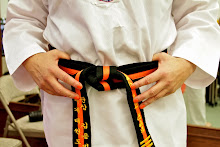"So," I ask them, "when all of this happens, and there aren't any stores, how are you going to get new clothes?" The general response is that they don't believe this is even worthy of consideration. The only relevant skill was zombie killing. "Do you know how to cook over an open fire? Can you take raw wool and turn it into a sweater? How about weaving a blanket? Can you do that?"
At this point they just stare at me in utter disbelief, as if the one and only skill worth having is knowing how to kill zombies in multiple ways. I remind them that, while I can't really run, I'm still a trained martial artist; I just need the zombie to be in range.
I know how to decapitate with a bamboo staff. (I mean, if it's a zombie, the head isn't firmly attached to begin with, so a bamboo staff, properly swung, should do the trick nicely.) I know how to punch, kick, and get out of holds. I have been trained on how to use another person's mass and momentum against them to render them incapacitated. Plus, I have lots & lots of pointy knitting needles and I'm not afraid to use them. Finally, I'm really not at all bothered by the idea of hurting someone trying to do me harm. I won't start a fight, but I don't have a problem finishing one.
While my sons and I joke around about my relative value in such a society, it does make me wonder about how all of the skills that I have spent a lifetime (so far) acquiring, practicing, and, in some cases, mastering, are actually valued in the present day. I'm not speaking about just my family members, but by society at large.
I remember the reaction that bringing a spinning wheel to the pool club elicited from other members. We spent countless hours at the pool when the boys were younger and since it was too hot and humid to knit, I brought the wheel. One older gentleman, from a former Soviet-bloc country, told me how he remembers how his grandmother would spin so that the family could have warm clothing in the long winters. Anyone under the age of ten wanted to sit in my lap and work the treadles. Others came up to me, completely confused as to what I was doing and I was doing it at all. One lady was kind enough to remind me that there was a yarn shop about twenty minutes away, so there was no real need to go to all the trouble of making my own yarn. You should have seen the look on her face, so pleased to be giving me such vital information.
While I don't expect absolutely everyone to be able to do all of the fiber-related activities that I do, I do expect most people to not freak out when the power goes out. Being able to get through a week or more without electricity can be challenging, but it certainly isn't impossible. I can remember a few storms when the power was out for days and days and many of my friends solved the problem by checking in to a hotel for the duration. They looked at me as if I were the crazy one by staying home. "Why would I leave?" I would ask, dumbfounded that it was even an option.
"How do you cook?" they would ask. I have a fireplace, a gas grill, and a charcoal grill. Check. "What about water and showers?" I have bottled water for drinking and downtown had power, so I showered either at the gym or a friend's house. I'm just down the road from a small pond that would do in a pinch. Check and check. "Aren't you cold at night?" I refer you to the paragraphs above which refer to knitting. I also quilt, so keeping warm gets a double check.
I also like the idea that I was teaching my boys about self-sufficiency and problem solving. It's easy to throw money at a problem to make it go away, but staying and dealing with the situation was a far more valuable lesson. Don't get me wrong-it was a lot of hard work, but I have never, ever regretted staying at home instead of going to a hotel during that long blackout or any that followed.
Questions would come up and asking Google wasn't an option, and it was fun to work through things together. (Also, without the internet as a distraction, it was amazing how much more interesting the cats became as a source of entertainment. I think they felt neglected when the power came back on.) They learned how to entertain themselves without an electronic screen and to pitch in and get things done around the house. They started to see the family as a team that needed to work together in order to get through the day. You just don't learn these things while dining on room service and watching Netflix in a hotel room.
So, yeah, in many ways, I feel like I'm ready for an Apocalypse. Evidently, I've spent most of my life training for it. Just get me a bodyguard and let me do my thing.






















